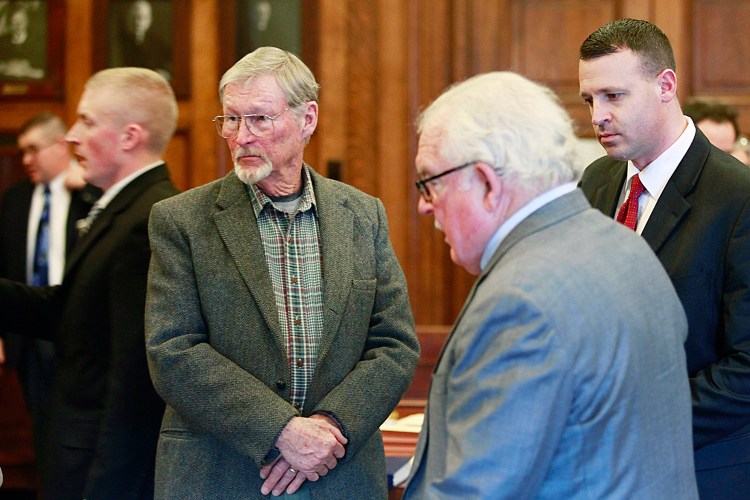Just moments after Leon Kelley fell to the ground when he was shot in the driveway of a North Yarmouth bee farm, his stepdaughter used her cellphone to take a photo of the man who fired at him, the gun still in his hand.
The photo showed Kelley, 63, sprawled on the gravel driveway clutching his abdomen as Merrill “Mike” Kimball, then 70, stood about 10 feet away, holding the pistol in one hand still aimed in Kelley’s direction with his other hand extended, palm open.
Jurors were shown the picture, printed on a poster-sized board, on the second day of Kimball’s trial at the Cumberland County Courthouse in Portland. The Yarmouth resident is charged with murdering Kelley on Oct. 6, 2013.
Kelley’s stepdaughter, Robin Rawnsley-Dutil, testified that immediately after taking the photograph, she began recording a video to capture the exchange between her and Kimball as Kelley lay on the ground between them, moaning.
“I can’t believe you (expletive) shot him,” Rawnsley-Dutil was heard yelling in the video, which was played for the jury on a television screen.
“What was I supposed to do?” Kimball replied.
“You are on private property,” Rawnsley-Dutil screamed.
“I’m 70 years old,” Kimball replied, as they briefly talked over each other.
The video ends with the sound of sirens approaching the scene of the shooting at Brown’s Bee Farm off Greely Road.
Kelley and Kimball had never met before that day, but the shooting followed a bitter, ongoing rift between the families of the two men over the bee business built by Stan Brown, a 95-year-old master beekeeper well-known in the state’s small beekeeping community.
Kimball’s wife, Karen Thurlow-Kimball, managed the farm and sold the honey. The two families had been at odds ever since Brown included Thurlow-Kimball in his will, leaving the bee business to her, along with four acres of his 10-acre property.
Brown’s daughters – including Kelley’s wife – and other members of the family were concerned that Thurlow-Kimball was taking advantage of their father as his memory began to fade.
Kimball, who is licensed to carry a concealed weapon, maintains he acted in self-defense when he fired three shots into Kelley’s torso after Kelley assaulted him, and after other members of Kelley’s family assaulted Kimball’s wife and her son.
Rawnsley-Dutil testified Tuesday that Kelley, who was 6 feet, 4 inches tall and weighed 285 pounds, put his hand on Kimball’s shoulders shortly before the shooting, spun him around and followed Kimball as he backed down the driveway.
Rawnsley-Dutil admitted under cross-examination by Daniel Lilley, Kimball’s attorney, that she could not tell how many times Kelley shoved Kimball because Kelley was blocking her view as they moved down the driveway.
Lilley said at the start of the trial that Kimball had no choice but to shoot Kelley, citing the Kelley family’s aggression and that Kimball had retreated 35 to 40 feet after being assaulted.
But Assistant Attorney General Matthew Crockett, who is prosecuting the case, said Kimball “overreacted” and could simply have waited for police to arrive.
The confrontation occurred after Kelley’s stepson, Craig Rawnsley, called Kimball’s wife about two hours before the shooting and accused her of wrongdoing at the bee farm.
Rawnsley-Dutil testified that she and her brother stayed on her grandfather’s farm after that call, and phoned their mother, Kathleen Kelley, and stepfather, Leon Kelley, at their home in Georgetown and asked them to come to the farm.
As the four of them stood outside Brown’s house, two vehicles pulled into the driveway and went past them, proceeding to the bee farm sales shop. Kimball was in the lead vehicle. Thurlow-Kimball and her son, Damon Carroll, followed in the second vehicle.
Rawnsley-Dutil said she and her brother followed the vehicles up the driveway on foot, followed by Kelley, who drove up in his truck.
Lilley has said Kimball and Carroll were there to help Thurlow-Kimball retrieve thousands of dollars worth of honey she had at the business in about two dozen 50-pound jars.
Rawnsley-Dutil testified that her family confronted Kimball’s family, while the Kimball family said little in response. She said Kimball asked who Kelley was, and that Thurlow-Kimball refused to leave the property, insisting on waiting for a police officer to arrive.
“Craig (Rawnsley) stood in front of the shop door,” she said. “He told them they weren’t getting into the shop door that day and they were trespassing.”
Kelley’s widow, Kathleen Kelley, took the stand after Rawnsley-Dutil, contradicting her daughter on several points. She was emotional at times, apologizing at many points.
The most glaring contradiction in her testimony came when she said Kimball was the aggressor and shoved Leon Kelley, and that Kelley never shoved back.
Kathleen Kelley testified that she and her husband came to the farm that day because she had power of attorney for her father and she had wanted to talk with her family about getting a restraining order against Thurlow-Kimball.
She admitted under cross-examination by Lilley, however, that the honey in the bee farm sales shop did belong to Thurlow-Kimball under a business agreement, that Thurlow-Kimball had keys to the shop and that Kelley’s family had no right to tell her to leave.
“We were just asking her to come back another time. We were trying to figure out what was happening,” Kathleen Kelley said. “When she started working with my father, she wanted to learn how to be a beekeeper. Then a couple of years later she was the manager. Then a couple of years later she was the owner. That was not true; she was not the owner.”
Kathleen Kelley also said she was concerned that her father’s bank account had been depleted.
Kimball has pleaded not guilty to the murder charge. He was never arrested in the case and has remained free on bail since he was indicted in 2013.
Scott Dolan can be contacted at 791-6304 or at:
Twitter: @scottddolan
Send questions/comments to the editors.



